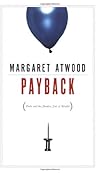

Cliquer sur une vignette pour aller sur Google Books.
|
Chargement... Comptes et légendes : La dette et la face cachée de la richesse (2008)par Margaret Atwood
 Actuellement, il n'y a pas de discussions au sujet de ce livre.   ) )A fascinating reflection on what it means to be in debt and to be owed. I highly recommend Atwood's 2008 CBC Massey Lectures. I like this rating system by ashleytylerjohn of LibraryThing (https://www.librarything.com/profile/ashleytylerjohn) that I have also adopted: (Note: 5 stars = rare and amazing, 4 = quite good book, 3 = a decent read, 2 = disappointing, 1 = awful, just awful.) I found this a very interesting view on Debt (financial and other) and man's attitude to it through the ages. Atwood explores it in the context of ancient civilizations and justice and then moves more into the modern era and considers the good and bad sides of debt. I was intrigued by the view that the requirement for money and capital flow that arose with the industrial revolution and capitalism changed our attitudes to debt radically. She also comes to the conclusion that money (rather than love) is often the driving force for change and narrative development in the great novels (Little Dorrit and Vanity Fair are the examples that spring to mind). The last chapter with her updating Scrooge to see a global view of man's debt to the world felt a bit preachy but was though provoking. Maybe because it's based on lectures, I did find that the whole book rambled slightly but as I've indicated contains many interesting pieces of information and different views on debt.
Atwood's project is to show how human thought has been deeply shaped by notions of debt. It will be objected that she is merely spinning out an extended metaphor suggesting analogies between debt and noneconomic phenomena that are only vaguely analogous. In fact she is advancing the contrary and more interesting claim that economic activities involving borrowing and lending are metaphorical extensions of an underlying human sense of indebtedness. Payback broaches an urgent topic in a way that won't make your eyes glaze over. In short, Margaret Atwood’s deeply enjoyable contemplation of debt comes from the same stable as the classic Presbyterian sermon about the sinners burning in hell who call out, ‘Lord, lord, we didnae ken.’ To which God replies, ‘Ah weel, ye ken noo!’ Because Atwood constantly veers off in new directions she doesn't always give herself time to sink her claws deep into a topic. The result is that, although Payback is packed with information, it can seem oddly thin. Payback is a stimulating, learned and stylish read from an eminent author writing from a heartfelt perspective. Appartient à la série éditorialeCBC Massey Lectures (2008) Prix et récompenses
Collected here, the Massey Lectures from legendary novelist Margaret Atwood investigate the highly topical subject of debt, exploring debt as an ancient and central motif in religion, literature, and the structure of human societies. Aucune description trouvée dans une bibliothèque |
Discussion en coursAucunCouvertures populaires
 Google Books — Chargement... Google Books — Chargement...GenresClassification décimale de Melvil (CDD)306.3Social sciences Social Sciences; Sociology and anthropology Culture and Institutions Economic institutionsClassification de la Bibliothèque du CongrèsÉvaluationMoyenne: (3.83) (3.83)
Est-ce vous ?Devenez un(e) auteur LibraryThing. |
|||||||||||||||||||||||||||||||||||||||||||||||||||||||||||||||||||||||||||||||||||||||||||||||||||||||||||||||||||||||||||